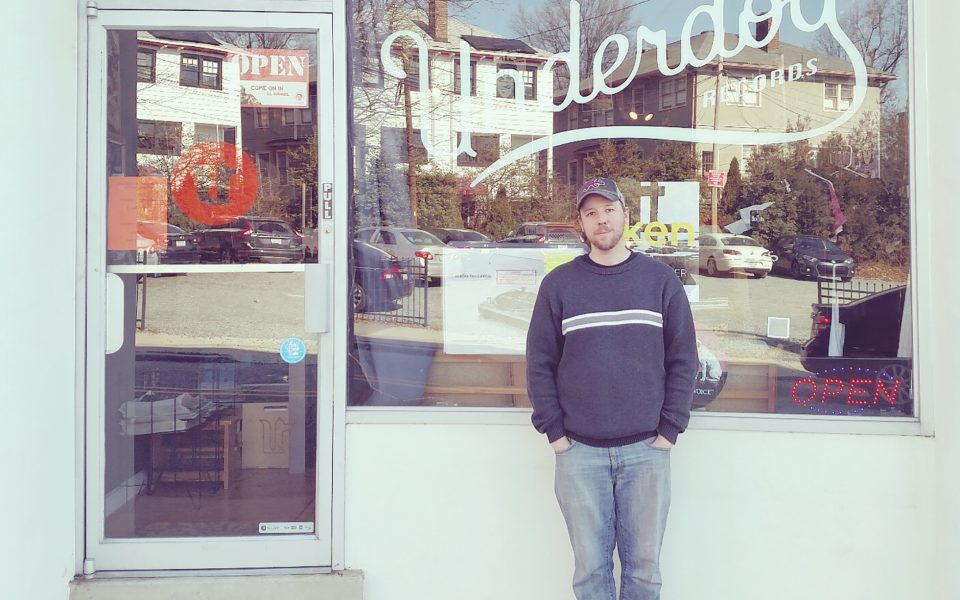It’s more than a romantic nostalgia, more than reliving those warm memories of flipping through your parents’ old record collection. For Jonathan Hodges, the love of music spins a little deeper.
“The first record I remember buying on my own was Desensitized by Pitchshifter,” Hodges said, leaning against a counter filled with stacks of used records. “I saved up some money and when I put it on, it was just unreal. It sounded beautiful and it was mine.”
Hodges owns Underdog records, one of the few independent record stores in the Triad, along with Earshot Records in Winston-Salem and Hippo Records in Greensboro. A brick-and-mortar store located on Burke Street in downtown Winston-Salem, Underdog opened its doors in 2013, bringing to life one of Hodges’ lifelong dreams.
“I had been working for the Record Exchange for almost seven and a half years,” Hodges said. “I learned all about buying and how to run a store, but opening my place was still there in my head. I had all of my own ideas that I couldn’t use in a chain store and I knew that if I didn’t try, I never would.”
A love of music was instilled early on in Hodges’ life. Getting lost in his parents’ cassette collection as a kid led to cultivating his own tastes and preferences, ultimately guiding him to vinyl.
“My basement is filled with boxes and boxes of my old CDs,” Hodges said, laughing. “I still have all of them, but can’t get myself to sell them or get rid of them. I was used to tapes and CDs but the first time I listened to a record, my mind was blown. It was Def Leppard’s Pyromania. It really changed my life.”
While a palpable element of nostalgia remains in selling records in the digital era, it takes a step beyond this notion and becomes more of an act of regaining a command over your music.
“I think vinyl is all about reclaiming ownership,” Hodges said. “When music was changing over to all digital, there was nothing left people to own. You don’t really own an mp3 file. I think people want to feel the record in their hands again.”
The current resurgence of vinyl records has been attributed to an array of sources, from a hipster movement that resurfaced forgotten vintage goods, to music fans craving higher quality sound in their music, but whatever the cause, the result remained the same. The renaissance has led to record companies re-pressing albums from the ’60s and ’70s, and contemporary bands who now release their music on vinyl, providing a temporal conduit for music once again.
Out of this has also spurred the need of what seemed a lost notion: that of leaving the house and going to buy your music once again. The resurgence of vinyl reflects a longing for tactile experience, for human interactions. While the dominance of digital listening has increased, so has the yearning to sit in front of the speakers poring over liner notes as the music drifts into the room.
“It’s an ever-shifting landscape,” Hodges said. “There’s no way of telling what will be popular tomorrow or a month from now. But by keeping things stocked and preserving them, it gives people a chance again. I get to watch firsthand what comes and goes: ’80s records are huge right now; there’s a resurgence of old jazz records now. It’s morphing constantly like a living thing.”
For Hodges, and for many independent stores like Underdog, the job is never quite done. Constantly checking on pricing trends, going through boxes and boxes of used records, Hodges is continuously stocking and reshaping his inventory, never knowing what trends might be on the rise.
“Honestly, being a part of this community is what keeps businesses like mine alive,” he said. “The support of this city has been amazing and I’m grateful to be able to keep going how I am.”
Having worked as an employee for a chain store, and now just into his fifth year of owning his own store, Hodges’ fidelity to vinyl and music remains the key element to his business. A savvy businessman, Hodges has a solid business model that sets him apart from his competitors. Expanding beyond the realm of becoming solely a niche record store, Underdog Records has made attempts to maintain an expansive stock, with something for anyone who comes in.
“To me, it’s about salvaging what otherwise might be lost,” Hodges said. “It’s about protecting the music, about acquiring anything and everything of value, not just monetary value, but personal value, and rescuing it. There’s a duty I feel that I have to give the music back to the people, back to the fans. Not some compressed, digital file, but music in its best form.”
Join the First Amendment Society, a membership that goes directly to funding TCB‘s newsroom.
We believe that reporting can save the world.
The TCB First Amendment Society recognizes the vital role of a free, unfettered press with a bundling of local experiences designed to build community, and unique engagements with our newsroom that will help you understand, and shape, local journalism’s critical role in uplifting the people in our cities.
All revenue goes directly into the newsroom as reporters’ salaries and freelance commissions.


Leave a Reply